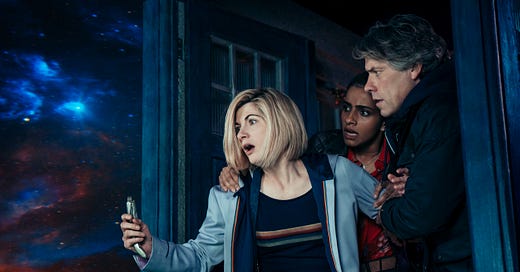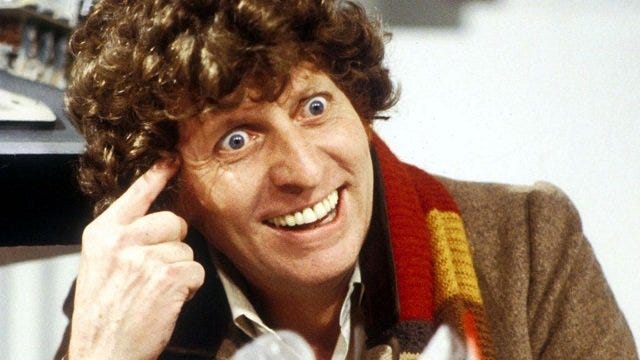Doctor Who: Overclocked Exposition Machine
What happens when a show begins to suffer from exposition poisoning.
Ah, Doctor Who. Teacher, mother, secret lover. For nearly 60 years, this weird, square children’s show has been the most consistent presence in the lives of many sci-fi fans1. The world turns and other franchises come and go, but with the exception of a notable 16-year period between 1989 and 2005 there was always a new season of Doctor Who to look forward to2. Or dread, depending on your opinion of the last regeneration—and there are opinions about each one, trust me.
Which is interesting, because we’re living in the Age of the Reboot3. Every single beloved SFF franchise seems destined for a reboot—Batman is headed for its fourth major reinterpretation, and every few years someone thinks they can breathe new life into the moribund Terminator franchise (good luck)4. But Doctor Who has them all beat, because it’s been rebooting itself since 1966, when original actor William Hartnell bowed out due to health issues. Faced with the absence of The Doctor’s face, producers decided that since he was an alien, the face could change5. The Doctor, being a Time Lord, didn’t exactly die—or at least he didn’t die easy. When he suffered damage he couldn’t recover from, he would regenerate into an all-new form, retaining some amount of his memory and developing a wholly new personality. Boom! A reboot.
After that, Doctor Who became one of the rare examples of a franchise that could reboot itself regularly without losing its core appeal—or at least, not all of its core appeal. There have been thirteen (fourteen if you count the War Doctor—fifteen if you count The Division Doctor and holy fuck it might be, like, six hundred the ways things are going) Doctors so far, with a new one on their way, and what’s remarkable is how each reboot has resulted in a thoughtful new version of the character that arguably grows organically from the previous incarnation6.
When Jodie Whitaker took on the role back in 20167, the show also gained a new showrunner in Chris Chibnall, a longtime fan of the show and accomplished television writer and producer. Whitaker’s Thirteenth Doctor has never quite gelled on the screen, and it’s not because she’s a woman, or because Chibnall writes Doctor Who like it’s 1970 and every story must be educational and divided into four parts. No, it’s because Chibs has turned The Doctor into a spluttering exposition machine8.
As You Know, Exposition Sucks

I read a lot of books, professionally and for pleasure, and I am amazed at how many authors simply don’t understand expository writing and why it can absolutely poison your narrative9. I mean, exposition is like reading a story and suddenly the next chapter is a fucking Power Point presentation, fifty-seven slides long and absolutely crammed with 8-point text. Which the author proceeds to read at you, verbatim10.
Often you can’t avoid exposition. Certainly, I’ve indulged in a fair bit of expository writing in my time—sometimes there’s simply no elegant way to show rather than tell. But there’s a difference between the occasional bit of exposition and soaking your story in pages and pages of the stuff.
And in all fairness, Doctor Who is a foundationally silly show that basically invents an entirely new alien race or ancient prophecy or existential threat every single episode, so exposition has been part of the show’s recipe since its beginning. When introducing a whole new civilization in a 45-minute episode—a civilization that may never get mentioned again—sometimes you have to run through its history, significance, and implications in a thirty-second speech. And that’s fine—scenes where The Doctor scream-sings a series of alarmingly made-up words while racing around the TARDIS are pretty much the show’s bread and butter11.
But the most recent incarnation relies on this device a lot, and it’s a lot. Poor Jodie Whitaker must have to hyperventilate before every scene in order to get through some of the exposition she’s tasked with12. On the one hand, see the comments above concerning exposition’s necessity in this show. On the other hand, it’s a problem for two reasons. One, the pacing and visuals of the episodes blur a bit, because there’s almost always a scene where The Doctor races around speed-talking an explanation13. And two, its obscured the character, because the Thirteenth Doctor is so busy explaining shit to us it’s been three seasons and they’re not so much a character as a collection of tics and a pair of suspenders.
Turn to Page 33 of the Shadow Proclamation
The expository mode of the Thirteenth Doctor can be traced directly to Chibnall’s love for classic Doctor Who, the version of the show that debuted in 1963 and ended in 1989. Originally conceived as an educational show wherein a kooky professor type would use his kooky time machine to teach kids about history, the show experienced shock evolution when a kooky story about a bunch of fascist salt shakers invading Earth turned it into 1963’s version of a viral hit14.
The desire to bring some of that classic educational energy back isn’t a bad one, really—frankly, it’s nice to have some real Earth history instead of yet another conspiracy concerning the Cybermen or forty more minutes of the Daleks screeching in those ear-splitting voices of theirs. But it essentially doubles the amount of exposition The Doctor has to race through in each episode. Aside from explaining the timey-wimey stuff, they also have to remind their idiot viewers who the very famous people are in the scene15.
This has made the Thirteenth Doctor something of a university lecturer, and has also crowded out any sort of inner conflict or, well, personality. Prior incarnations usually had some pretty hefty demons to deal with—Nine was a traumatized genocidal murderer, Ten was a lonely god, Eleven kind of a brooding, resentful sort seeking to evade self-reckoning, and Twelve questioned whether the universe needed a Doctor at all. These aspects of their personalities informed the stories. Thirteen’s complete lack of inner turmoil has reduced her to an entertaining demigod who seems to really enjoy breathlessly explaining things to you while pulling levers.
Of course, the quality of Doctors has varied widely over the years—and every Doctor Who fan has their favorite who they will typically defend to their last breath. And often you don’t know how much you enjoyed a particular Doctor until they’re gone16—so maybe a few years from now we’ll miss Jodie Whitaker’s high-energy history lessons (we’ll certainly miss her performance, the lessons: Not so much).
Now, if you’ll excuse me, I have a large cardboard box on which I’ve written TIME MASHEEN in black marker, and I’m taking my stuffed tiger and visiting the future, where there had better be some flying cars.
Next week: The most bizarre movie The Monkees ever made.
All of which appeared to be have been filmed in someone’s garage, with their mum sewing the costumes, but I am reliably informed that this was actually part of the show’s charm.
At this point they’re basically rebooting movies before the current version has even been released.
To be fair, I am enjoying the increasingly tortured ways they explain Arnold Schwarzenegger’s presence in the films. Look, I can believe that a screwed-up AI that just murdered its own gods would create the abomination that is the original Terminator, bizarre Austrian accent and all. But to keep making the same model over and over again clearly points to a closed GOTO loop somewhere in its programming.
This was, and remains, a brilliant piece of practical writing.
Do I want a Doctor Who movie that is basically Sean Ferrell’s The Man in the Empty Suit where like 100 Doctors converge on an abandoned hotel for a party and then have to investigate the murder of one of their own incarnations (The Sixth Doctor, obviously)? DO YOU NOT?
A lady Doctor? What a time to be alive!
Suspending disbelief is hard enough. But if you’ve ever tried to explain how to edit the Windows registry to someone who does not understand computers at all you will find it very difficult to believe that Doctor Who spends all that energy explaining time and the universe to idiots. How in the world have they not simply ended the universe just to vent their frustration?
Or how many of them actually start their expository sections with “As you know.” C’mon, man, read a book!
I have known the horrors of Power Point Presentations, known them all already, known them all. Someday future alien scientists will wonder why human society collapsed and they will discover Power Point and the mystery will be solved.
Sure, but when I scream-sing made up words while racing about wearing suspenders and a fez, I get no respect at all.
One episode in Season 13 literally has The Doctor hanging in mid-air in a “Time Storm” reciting exposition to a group of time-controlling beings. They might as well change the name of time storms to Exposition Hurricanes.
It doesn’t help that The Doctor is one of that rare subclass of characters who rarely if ever changes their clothes.
Yes, the Daleks: The silliest alien villains ever conceived. They’re supposed to be the deadliest genocidal creatures in the universe but they look like a group of schoolchildren could knock them all over with a vigorous push.
And of course the writers have a very British sense of what historical figures are important, which is often adorable.
I missed all the “Fuckity-BYE” memes when Peter Capaldi gave up the role, I can tell you that.







Many years ago, I created a 57-slide PowerPoint presentation demonstrating that if we ever invent time travel web shouldn’t go back and kill Hitler; we should go back and kill the entire PowerPoint development team. Harsh, but it’s the only way to say humanity.